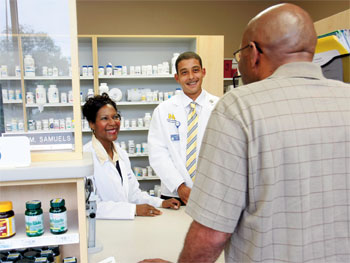2009 Preceptor of the Year Award-Winner: Kiela Samuels, PharmD'87
 As the daughter of a minister father and a nurse mother, Kiela Samuels, PharmD'87, was hard-wired for community service from an early age. It's a life philosophy she passes on to every one of the eight or more PharmD students she precepts each year.
As the daughter of a minister father and a nurse mother, Kiela Samuels, PharmD'87, was hard-wired for community service from an early age. It's a life philosophy she passes on to every one of the eight or more PharmD students she precepts each year.
"One of the major lessons I try to impress upon PharmD students is the privileged status pharmacists hold in our society," explains Samuels, winner of the College's 2009 Preceptor of the Year Award. "We are entrusted with the care of our fellow citizens, and then expected to act ethically and always in the patient's best interest. We are called to a higher commitment, to do everything that we can do to help improve the communities in which we live and work." Samuels says that she often uses a student's first week on rotation to assess strengths and weaknesses. If she finds a particular strength, she'll assign an initial skill-complementary project as an early confidence builder. And if she identifies weaknesses?
"We are going to work on those, too," Samuels states. "It's human nature to avoid areas where we are weak. I want students to develop self-assurance in their ability to make progress in areas where they might be lacking. I believe that the best way to get past your fear is through action."
Samuels structures student learning experiences with an emphasis on "solving real-life challenges in real-time. In pharmacy school, the learning scenarios are mostly scripted," she explains. "You need those to teach you how to analyze and solve a problem. But the best experiential training puts you in situations requiring you to think on your feet."
Because Samuels typically makes two, three, or more community presentations during each, four-week clinical rotation, the students on her rotation have ample opportunities for involvement outside, as well as inside, the workplace. Not only do students benefit from extra patient counseling experience during community outreach events, they also receive lots of "thinking-on-your-feet" practice, with Samuels there to catch them if they falter.
PharmD students rotating with Samuels get an unusual practice package. On top of her full-time commitment as co-owner and vice president for clinical operations at THE Pharmacy in Ypsilanti, founded two years ago, she doubles as a part-time internal medicine pharmacist at U-M Hospital. Students assigned to her community practice rotation spend one day a week in her allergy extract lab.
"PharmD students find my internal medicine practice very exciting and unusual," she says. "Most never knew a pharmacist could run an immunotherapy program."
Samuels enjoys the flexibility that comes with this part-time position, as well as the opportunity to exercise a different set of problem- solving and education skills than she uses in community practice.
In Samuels, students have a vivid example of the diverse career paths they might follow. In addition to her current community pharmacy/internal medicine practice combo, Samuels has been a consulting pharmacist for nursing homes, an assistant manager of hospital pharmacy services, an assistant manager of clinical services at a consulting pharmacy services firm, an academia pharmacist, a clinical pharmacist for Turner Geriatric Clinic, and an independent consultant in a variety of capacities.
One of her most unusual consulting assignments was as a medical operations consultant to NASA where she was part of a team that conducted a formulary review of the drugs that astronauts would take with them to the space station.
"We convened at Johnson Space Center in Houston, Tex., met with astronauts who were physicians, and provided our expert opinions on therapy recommendations," Samuels says. "That was a lot of fun."
With all of those professional experiences, Samuels is clear about one thing:
"Being a pharmacy owner is the most challenging thing I've done in my career," she asserts. "What I like most about it is the lack of red tape. You see opportunities, and you respond. No layers of approval, or drawn-out processes. It's a lot easier to change and adapt in a small organization. The downside is that your actions are constrained by resource limitations." Have any students expressed an interest in following in her pharmacy-owner footsteps?
Samuels laughs. "They say they admire what I am doing, but that it seems like too much work. They cannot see themselves being a pharmacy owner; at least, not at this point in their career. I tell them: If I can do it, you can do it. I'm no one special. You have to make a decision and then summon the determination to follow through. Success is not guaranteed. It never is. But you never know how it will work out until you try."
Except for one year, Samuels has been a Michigan Pharmacy preceptor non-stop since 1990. Yes, there is a time commitment in choosing to be a volunteer preceptor, Samuels says, yet the rewards are well worth it.
"I find it mutually beneficial to be a preceptor," she explains. "The students who rotate with me are getting good experience, and, at the same time, they are contributing to my daily activities. Especially with a new pharmacy there are always new activities and patient education programs that need to be developed, implemented. The students make me more productive because they want to learn by doing."



